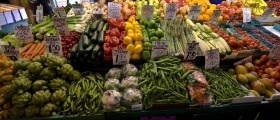
Salmonella is a name given to a group of about 2,500 different but similar bacteria, which, once consumed, trigger gastroenteritis and typhoid fever in humans. Also, salmonella can affect animals as well as birds, especially poultry, triggering diseases. Humans usually get this bacteria through spoiled or inadequately prepared food.
More about Salmonella
Salmonella has many species and subspecies, depending on a specific type of bacteria triggering the food poisoning symptoms in one's body. However, while some scientists may divide salmonella bacteria into two major groups, others may insist of naming each of the subspecies separately.
Either way, these bacteria were initially isolated by Theobald Smith in 1885. He found these in pigs and gave them the name they had today derived from his director Mr. Salmon. Until 1896, numerous researches on this matter have lead to successful diagnosis of salmonella in human beings.
Prevention of Salmonella
Before anything else, you need to make sure that hygiene is your primary concern. Wash your hands regularly, using antibacterial soaps with warm, even hot water, especially after handling eggs, raw meat or other raw food. Next, keep in mind that pigs, turtles, snakes and some other animals are main carriers of salmonella, so stay clean after you get in contact with these.
Some people are carriers of salmonella. These people should never work in restaurants or handle food to be eaten by others. Rather, these people should be admitted to hospitals and subjected to analysis and tests. Once this is done, if they truly are carriers of salmonella, their gallbladder should be removed and they should undergo antibiotic treatment.
Vegetables like tomatoes, as well as peanuts, pistachios and other similar types of food have been reported to be infected with salmonella too. Thus, know that, throughout history, many products were recalled due to salmonella infection. Be careful and buy fresh and natural food from safe sources. Many food companies and farms work under terrible hygienic conditions, risking having salmonella in every product they sell.
Animals with salmonella can be treated with vaccines. Unfortunately, there is no such vaccine for humans, except for those suffering from typhoid fever. Even those people are not advised to get vaccinated, except in cases of emergency or epidemics.
All farmers and people who are in the food business should pay attention to maintaining proper hygienic conditions at all times, producing nothing but safe food for others to consume. Salmonella appears in neglected areas where hygienic levels are low and dirt and feces are not regularly cleaned.

















Your thoughts on this
Loading...